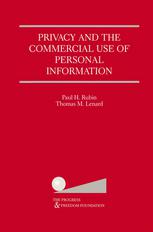

Most ebook files are in PDF format, so you can easily read them using various software such as Foxit Reader or directly on the Google Chrome browser.
Some ebook files are released by publishers in other formats such as .awz, .mobi, .epub, .fb2, etc. You may need to install specific software to read these formats on mobile/PC, such as Calibre.
Please read the tutorial at this link: https://ebookbell.com/faq
We offer FREE conversion to the popular formats you request; however, this may take some time. Therefore, right after payment, please email us, and we will try to provide the service as quickly as possible.
For some exceptional file formats or broken links (if any), please refrain from opening any disputes. Instead, email us first, and we will try to assist within a maximum of 6 hours.
EbookBell Team

5.0
70 reviewsHon. Orrin G. Hatch United States Senate Electronic commerce will be pivotal to the United States economy in the 21 SI Century. With the advent ofelectronic commerce, some consumers have become concerned about the disclosure, transfer, and sale of information which businesses have collected about them. These concerns purportedly are slowing the rate ofexpansion ofelectronic commerce, thereby putting at risk the future growth of the New Economy. To reduce this risk, a variety of schemes have been proposed under which the government would regulate online privacy. Congress currently is in the midst ofa vigorous debate as to whether the government should regulate on-line privacy standards, and, ifso, what form such regulation should take. This succinct yet powerful book by Paul Rubin and Thomas Lenard goes to the heart of these issues. It explains that there is no evidence of actual consumer harm or market failure that could justify burdensome government regulation of online privacy. It describes the tremendous advantages consumers currently receive from the free flow of information collected on line, advantages which could be eliminated if the government unnecessarily regulates and stops this flow of information. It argues that the free market provides businesses with compelling incentives to adopt their own measures - such as seal programs and novel technologies - to assuage consumer privacy concerns. This book presents compelling evidence to support these and many other points central to the continuing debate in the halls of Congress and elsewhere concerningonline privacy.